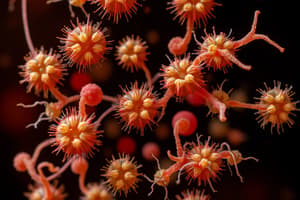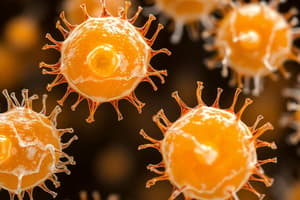Podcast
Questions and Answers
What does applied microbiology primarily focus on?
What does applied microbiology primarily focus on?
- Theoretical studies of microorganisms in isolation
- Investigation of non-infectious diseases
- Pure research without practical applications
- Utilizing knowledge of microbes for societal benefits (correct)
Which of the following best describes clinical microbiology?
Which of the following best describes clinical microbiology?
- Specializes in vaccine development
- Focuses on microbial genetics
- Studies the ecological impact of microorganisms
- Deals with the laboratory diagnosis of infectious diseases (correct)
Which statement accurately reflects the contributions of medical microbiology?
Which statement accurately reflects the contributions of medical microbiology?
- Its research is limited to bacterial species only.
- It has shown no impact on disease prevention.
- Advances have helped eradicate diseases like smallpox. (correct)
- It primarily focuses on the commercial use of microbes.
What area of study does the field of parasitology cover?
What area of study does the field of parasitology cover?
Which method is NOT a focus of medical microbiology?
Which method is NOT a focus of medical microbiology?
Who is often referred to as the 'Father of Microbiology'?
Who is often referred to as the 'Father of Microbiology'?
Which of the following options refers to microbes that live on dead organic material?
Which of the following options refers to microbes that live on dead organic material?
In the context of microbiology, which branch deals with the patterns and transmission of diseases?
In the context of microbiology, which branch deals with the patterns and transmission of diseases?
What is the first step of Koch's Postulates?
What is the first step of Koch's Postulates?
Which of the following is NOT an exception to Koch's Postulates?
Which of the following is NOT an exception to Koch's Postulates?
What is a microbiologist who specializes in the study of fungi called?
What is a microbiologist who specializes in the study of fungi called?
Which specialization focuses on the study of algae?
Which specialization focuses on the study of algae?
Which of the following career paths involves the study of viruses?
Which of the following career paths involves the study of viruses?
Which step in Koch's Postulates must be fulfilled after infecting a healthy organism?
Which step in Koch's Postulates must be fulfilled after infecting a healthy organism?
What characterizes obligate intracellular pathogens?
What characterizes obligate intracellular pathogens?
What is the focus of genetic engineering in the context of microorganisms?
What is the focus of genetic engineering in the context of microorganisms?
What defines an opportunistic pathogen?
What defines an opportunistic pathogen?
Which of the following is NOT a type of microbe?
Which of the following is NOT a type of microbe?
Koch's Postulates are used for what purpose?
Koch's Postulates are used for what purpose?
In which situation might Koch's Postulates not apply?
In which situation might Koch's Postulates not apply?
Which of the following describes the role of microbes in bioremediation?
Which of the following describes the role of microbes in bioremediation?
What is the primary distinction between infectious diseases and microbial intoxications?
What is the primary distinction between infectious diseases and microbial intoxications?
Which career field in microbiology focuses on the roles of microbes in agricultural practices?
Which career field in microbiology focuses on the roles of microbes in agricultural practices?
What defines acellular microbes?
What defines acellular microbes?
Flashcards are hidden until you start studying
Study Notes
What is Microbiology?
- Microbiology is the study of microorganisms (microbes), which are microscopic organisms.
- Microbes are too small to be seen with the naked eye.
- Microbes are ubiquitous, meaning they are found everywhere.
Types of Microbes
- Microbes can be classified as acellular or cellular.
- Acellular microbes:
- Viruses
- Prions
- Cellular microbes:
- Bacteria
- Archaea
- Protozoa
- Some algae
- Fungi
- Pathogens: Microbes that cause disease.
- Non-pathogens: Microbes that are beneficial or neutral.
Importance of Microbiology
- Microbes are important for a wide range of reasons, including:
- Their role in our bodies:
- There are 10 times more microbes on and in the human body than there are human cells.
- Indigenous microflora are beneficial microbes that inhibit pathogens.
- Opportunistic pathogens are normally harmless, but can cause infections in certain conditions.
- Bioremediation:
- Using microbes to clean up industrial waste.
- Elemental cycles:
- Microbes are important in the carbon, nitrogen, oxygen, sulfur, and phosphorus cycles.
- Their role in our bodies:
Koch's Postulates
- A set of four postulates established by Robert Koch to demonstrate a specific microbe causes a specific disease.
- The postulates:
- The microbe must be found in all organisms suffering from the disease, but not in healthy ones.
- The microbe must be isolated and grown in pure culture.
- The same disease must develop when microbes from the pure culture are introduced to a healthy organism.
- The microbe must be re-isolated from the newly infected organism and be identical to the original microbe.
Exceptions to Koch's Postulates
- Some pathogens do not meet all Koch's Postulates:
- Obligate intracellular pathogens:
- Require living host cells to survive and cannot be grown on artificial media.
- Examples include viruses, rickettsias, and chlamydias.
- Species specificity:
- Some pathogens only infect humans, making it challenging to test them on animal models.
- Synergistic infections:
- Some diseases are caused by multiple microbes, making it difficult to isolate the specific pathogen.
- Obligate intracellular pathogens:
Careers in Microbiology
- There are numerous career paths for microbiologists, who can specialize in different areas:
- Bacteriology:
- Focuses on bacteria, their structure, function, and activities.
- Specialists are called bacteriologists.
- Phycology (Algology):
- The study of algae.
- Specialists are called phycologists or algologists.
- Protozoology:
- The study of protozoa and their biology.
- Specialists are called protozoologists.
- Mycology:
- The study of fungi.
- Specialists are called mycologists.
- Virology:
- Focuses on viruses and their interactions with living cells.
- Virologists may also study prions and viroids.
- Genetic Engineering:
- Involves transferring DNA between cells to explore the genetic aspects of microorganisms.
- Bacteriology:
Applied Microbiology
- Involves using knowledge of microbes in practical ways:
- Medically related fields:
- Medical Microbiology:
- Focuses on pathogens, the diseases they cause, the body's immune response & defense mechanisms, epidemiology, and disease prevention.
- It has contributed to disease eradication and modern surgical safety.
- Clinical (Diagnostic) Microbiology:
- Involves laboratory diagnosis of infectious diseases, making it suitable for careers in laboratories and public health.
- Medical Microbiology:
- Medically related fields:
Studying That Suits You
Use AI to generate personalized quizzes and flashcards to suit your learning preferences.




